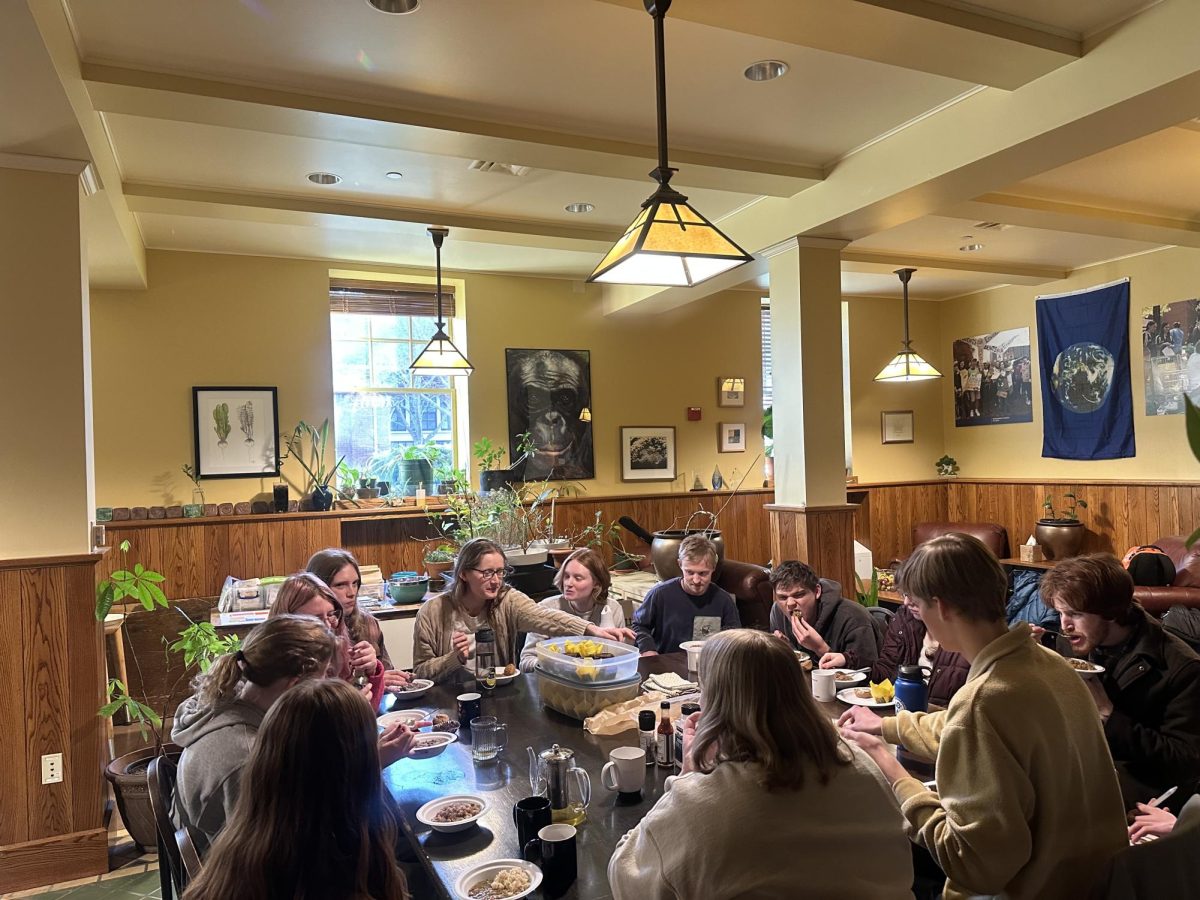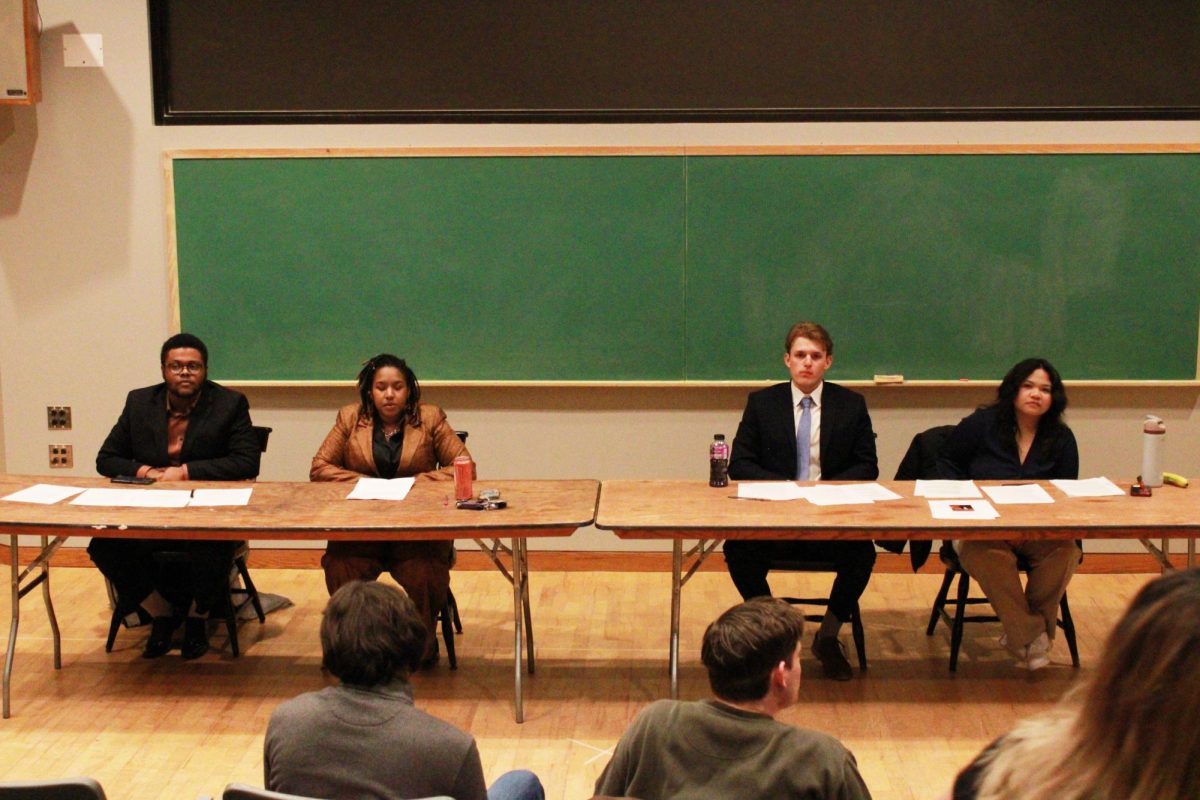Susan has two daughters. And for years, they lived without a home. Finally, Susan sought help from local shelters and managed to overcome her situation.
“I’ve lived a desperate life for years,” said Susan, who requested to be identified solely by her first name. “So after I hit bottom, I had to reach out.”
Panelists shared stories like this and many others at Tuesday’s “Pathways out of Homelessness: Voices from the Meadville Community” panel, organized by students from the Values, Ethics and Social Action capstone course.
Three other members of the Meadville community who had personally experienced homelessness spoke on the panel in order to share their experiences with Allegheny students and the Meadville community.
“I just want to offer hope to other people,” Susan said.
Susan explained that she was approached by a woman she had known for years who works for the Coalition of Housing Needs in Meadville to share her experiences.
“She’s seen my journey, and seen that I’ve made a full circle,” she said.
Susan believes that the panel bridged a gap of miscommunication between the homeless community, Allegheny students and the Meadville community at large.
“Sometimes there’s a stigma with the students,” she said. “The community stigmatizes them, too, because they’ve never seen rough roads. We wonder if the students realize that [homelessness] can happen to anybody.”
To bridge that gap, Grant Fleming, ’11, and Carly Braden, ’11, organized and hosted the panel.
“Collectively, the VESA Capstone course brought the panel to campus, explained Braden. “But Grant and I were the faces of the project, and the ones who did the research and found the formerly homeless panelists, met with them, and created a relationship.”
“This has been a really powerful and heartwarming project for me,” she added. “When Grant and I chose to do this project, I do not think either of us could have envisioned the impact it would have on us.”
Fleming and Braden chose to organize a panel to raise public awareness for the plight of Meadville’s destitute and to break down stereotypes surrounding the community.
Fleming and Braden worked extensively with Crawford County Mental Health Awareness Program, known as CHAPS, to bring the four panelists to campus.
Each of the panelists lived on the streets for a period of time and were eager to share their stories with students.
Fleming also spoke of the common misconceptions many people harbor about the homeless.
“Most people think the homeless live in a city and ask for change,” he said.
He believes the panel helped to dispel the negative perception students may have of the homeless and encourage them to get involved with helping the community.
The panel affected Braden deeply, and she believes it impacted other students powerfully as well.
“During the discussion, [one of the panelists] had mentioned his time in Pittsburgh being homeless,” she said. “I had to stop and wonder, had I ever passed him? Had I ever stopped and given him food?”
“You never really think about the impact you are making with your left over doggy bag or an extra hamburger from McDonalds until you talk to someone you may have impacted,” she added.
Since escaping poverty, Susan has dedicated her time to raising awareness for the homeless.
Susan hopes that her testimony will inspire students and Meadville citizens to help their struggling neighbors.
“I’m always willing to help,” she said. “A lot of people helped me. It’s like [one of the panelists] said earlier, ‘Pay it back.’”
Susan has two daughters.
And for years, they lived without a home.
Finally, Susan sought help from local shelters and managed to overcome her situation.
“I’ve lived a desperate life for years,” said Susan, who requested to be identified solely by her first name.
“So after I hit bottom, I had to reach out.”
Panelists shared stories like this and many others at Tuesday’s “Pathways out of Homelessness: Voices from the Meadville Community” panel, organized by students from the Values, Ethics and Social Action capstone course.
Three other members of the Meadville community who had personally experienced homelessness spoke on the panel in order to share their experiences with Allegheny students and the Meadville community.
“I just want to offer hope to other people,” Susan said.
Susan explained that she was approached by a woman she had known for years who works for the Coalition of Housing Needs in Meadville to share her experiences.
“She’s seen my journey, and seen that I’ve made a full circle,” she said.
Susan believes that the panel bridged a gap of miscommunication between the homeless community, Allegheny students and the Meadville community at large.
“Sometimes there’s a stigma with the students,” she said. “The community stigmatizes them, too, because they’ve never seen rough roads. We wonder if the students realize that [homelessness] can happen to anybody.”
To bridge that gap, Grant Fleming, ’11, and Carly Braden, ’11, organized and hosted the panel.
“Collectively, the VESA Capstone course brought the panel to campus, explained Braden. “But Grant and I were the faces of the project, and the ones who did the research and found the formerly homeless panelists, met with them, and created a relationship.”
“This has been a really powerful and heartwarming project for me,” she added. “When Grant and I chose to do this project, I do not think either of us could have envisioned the impact it would have on us.”
Fleming and Braden chose to organize a panel to raise public awareness for the plight of Meadville’s destitute and to break down stereotypes surrounding the community.
Fleming and Braden worked extensively with Crawford County Mental Health Awareness Program, known as CHAPS, to bring the four panelists to campus.
Each of the panelists lived on the streets for a period of time and were eager to share their stories with students.
Fleming also spoke of the common misconceptions many people harbor about the homeless.
“Most people think the homeless live in a city and ask for change,” he said.
He believes the panel helped to dispel the negative perception students may have of the homeless and encourage them to get involved with helping the community.
The panel affected Braden deeply, and she believes it impacted other students powerfully as well.
“During the discussion, [one of the panelists] had mentioned his time in Pittsburgh being homeless,” she said. “I had to stop and wonder, had I ever passed him? Had I ever stopped and given him food?”
“You never really think about the impact you are making with your left over doggy bag or an extra hamburger from McDonalds until you talk to someone you may have impacted,” she added.
Since escaping poverty, Susan has dedicated her time to raising awareness for the homeless.
Susan hopes that her testimony will inspire students and Meadville citizens to help their struggling neighbors.
“I’m always willing to help,” she said. “A lot of people helped me. It’s like [one of the panelists] said earlier, ‘Pay it back.’”









